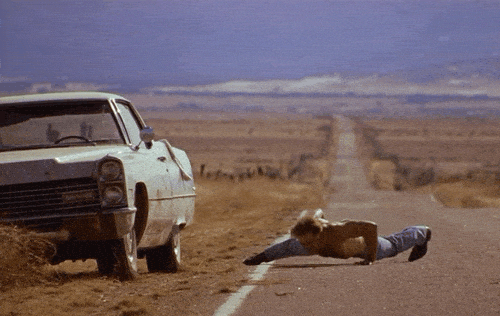For a film rich with twists and turns, Red Rock West’s journey to the big screen was fittingly circuitous.
In the 90s, before streaming threw a wrench in things, a film’s lifecycle tended to ebb in the predictable flow of theatrical release, small screen, home video. But Red Rock West did just the opposite in no small part thanks to the right people being at the right place at the right time.
Which feels particularly appropriate for a film where a good man finds himself in the wrong place at the wrong time, again, and again, and again.


Condemned by Columbia Tristar to direct to video and cable, Red Rock West was never meant to enjoy a domestic theatrical run. According to marketing consultant Peter Graves, “a western film noir isn’t something people can immediately spark to.” This claim becomes especially heinous when you remember that Blood Simple premiered about a decade earlier. As if there is any weight to the claim that generic purity holds more sway than, oh I don’t know, the actual merit of a film.

In other words…
While Red Rock had been denied a stateside debut, it screened successfully on the international circuit. And by chance Piers Handling, the then-director of the Toronto International Film Festival, happened to catch a screening in Paris in the summer of ’93 and resolved to show the film at the festival that coming fall. As luck would have it, one of the people in attendance at a Red Rock TIFF screening was Bill Banning, the owner of San Fransisco’s Roxie Cinema, and the man single-handedly responsible for Red Rock’s domestic theatrical release. Banning obtained the rights to screen Red Rock, and began exhibiting the film only two weeks before its slated DTV release. The film quickly broke The Roxie’s in-house box office record and secured a wider domestic showing.
I’m telling you about Red Rock’s rocky road to the big screen for two reasons. First, because I think its damned interesting. And second, because it does a good job of illustrating a tension at the core of Red Rock’s appeal. For the studios, the vagaries of the film’s genre made it a hard sell. They mistook Red Rock’s generic unruliness for irreverence; as an obstruction that would confuse and ostracize audiences who wouldn’t know what to make of this neo-noirish western Wyoming-set thriller. Handling, Banning, and many others since recognized that unruliness as the mark of a film made by people who love film and who can’t help but affix that love onto every frame. When pulled off elegantly, such love takes on a radiant, contagious quality, spurring viewing parties, topping film recommendation lists, and, in the case of Red Rock, rescuing a film from a fate of DTV obscurity.

And to think we would have been denied the greatest cold open of all time.
The film opens with our surprisingly principled and likable protagonist Michael (Nic Cage in his “most under-appreciated movie”), a drifting ex-marine, waking up on the side of the road in his car. He’s looking for work. And a buddy has hooked him up with a job as an oil-rigger. But Michael is honest, and immediately blows his shot by admitting that he’s got a bum leg. Later, when he stops for gas with naught but five dollars to his name he resists reaching into an unguarded, open till for some much-needed cash.
Temptation the third time around, however, is less easily ignored. On the advice of the gas station attendant, Michal rolls his seedy old Cadillac into the sleepy town of Red Rock, where he heads to the local watering hole looking for work. The proprietor (J.T. Walsh) mistakes Michael for the hitman from Dallas he hired to snuff out his unfathomably gorgeous, and much younger wife, Suzanne (Lara Flynn Boyle). In a moment of weakness, Michael can’t resist the money any more than he can resist Suzanne’s offer to double her husband’s fee. Before he can blink twice, Michael finds himself embroiled in a deadly quadrangle. Turns out the proprietor is also the sheriff. And to make matters worse, the actual hitman (Dennis Hopper) shows up, none too pleased that such a simple hit has been so thoroughly botched.
We’ve been to Red Rock many times: it’s a town where sordid plots lie in wait in deceptively sleepy settings, where grudges run deep, and where big, heavy bags of bills are always the greatest motive. Red Rock places the neo-noir ticks of femme fatales, rain, and shadow — so evocatively captured in earlier films like Stormy Monday (1988) and Body Heat (1981) — pitching them against the desolation of the contemporary west like Blood Simple (1984) before it.
Red Rock features train-racing sequences that wouldn’t be out of place in 1970s crime thriller. There are undertones of the jean jacket neo-western stylishness of Delusion (1991) and One False Move (1991). The film’s clever plotting, wide-open spaces, and infatuation with repercussion resemble a Coen Brothers film. It’s attention to passion, revenge, and its quirky sense of humor are reminiscent of Lynch. The narrative zigzags are worthy of noir classics like Double Indemnity (1944) and The Postman Always Rings Twice (1946). It’s a film that exists, sneakily and reverently, between western, thriller, film noir, and black comedy, all at once.
No surprise then that each character feels elemental and utterly familiar. There’s Cage, the nice guy in a big jam; the fundamentally good guy who gets his hands on too-good-to-be-true easy money only for it to backfire spectacularly. Boyle’s Suzanne offers up a cooly calculating, deceptively soft-spoken femme fatale; sultry, liquored up, and not to be fucked with. J.T. Walsh’s Wayne Brown is crooked and blinded by the promise of having a fortune to himself. And, of course, there’s Hopper playing to his strengths: the charming psycho, the well-tailored man in black with the dangerously disarming folksy drawl.




Red Rock’s resonances with other films and cinematic genres are not the whole story of what makes Red Rock great. While undeniable, Red Rock’s cinephilia never feels pandering, gross, or distracting. It is, first and foremost, a film thoroughly committed to telling its own story; weaving the threads, tightening them when necessary, and unraveling them all in the end.
Rather than any sense of pretension or self-congratulatory intertextual jerk-offery, watching Red Rock, one feels that the folks who made it enjoy watching film and enjoy making it. That they want to make movies in large part to share and celebrate the things they love to watch; the gritty textures of superficial, snow-globe small-towns; the narrative cascade of a hit gone wrong; the stomach-pit panic playing out on a character’s face when they realize how much shit they’re in.
That kind of love is contagious and makes for a viewing experience whose pleasures lie not only in but between and beyond the machinations of plot. It’s the kind of film you watch and want to show to other people. So, with that: go watch Red Rock West and adios.

The post The Infectious Cinephilia of ‘Red Rock West’ appeared first on Film School Rejects.

0 comments:
Post a Comment